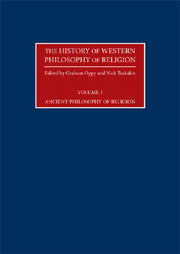Book contents
- Frontmatter
- Contents
- Editorial Introduction
- Contributors
- 1 Ancient Philosophy of Religion: An Introduction
- 2 Pythagoras
- 3 Xenophanes
- 4 Socrates and Plato
- 5 Aristotle
- 6 Epicurus
- 7 The Stoics
- 8 Cicero
- 9 Philo of Alexandria
- 10 The Apostle Paul
- 11 Plutarch of Chaeroneia
- 12 Sextus Empiricus
- 13 Early Christian Philosophers: Justin, Irenaeus, Clement of Alexandria, Tertullian
- 14 Origen
- 15 Plotinus
- 16 Porphyry and Iamblichus
- 17 The Cappadocians: Basil of Caesarea, Gregory of Nazianzus, Gregory of Nyssa
- 18 Augustine
- 19 Proclus
- 20 Pseudo-Dionysius
- Chronology
- Bibliography
- Index
14 - Origen
- Frontmatter
- Contents
- Editorial Introduction
- Contributors
- 1 Ancient Philosophy of Religion: An Introduction
- 2 Pythagoras
- 3 Xenophanes
- 4 Socrates and Plato
- 5 Aristotle
- 6 Epicurus
- 7 The Stoics
- 8 Cicero
- 9 Philo of Alexandria
- 10 The Apostle Paul
- 11 Plutarch of Chaeroneia
- 12 Sextus Empiricus
- 13 Early Christian Philosophers: Justin, Irenaeus, Clement of Alexandria, Tertullian
- 14 Origen
- 15 Plotinus
- 16 Porphyry and Iamblichus
- 17 The Cappadocians: Basil of Caesarea, Gregory of Nazianzus, Gregory of Nyssa
- 18 Augustine
- 19 Proclus
- 20 Pseudo-Dionysius
- Chronology
- Bibliography
- Index
Summary
It would seem that Origen (c.186–c.255) was born into most unpropitious circumstances. His family belonged to the Christian minority, which educated pagans reviled and the Roman Empire outlawed as an unpatriotic religious novelty. In the persecutions of Septimius Severus, his father, Leonides, was beheaded and the family's property confiscated. The seventeen-year-old Origen, as eldest son, was charged with supporting the family of ten, which he did by teaching literature to private students and, later, the elements of Christianity to catechumens, neither job prestigious. What mattered most to Origen, however, was to become ever more Christ-like and to illuminate, for himself and others, the mysteries hidden in the Scriptures. His various biographers, although not impartial, still paint a reliable picture of Origen's remarkable virtue, while many of his views, adopted by Athanasius, Augustine, and the Cappadocians, marked the mainstream of both Eastern and Western Christianity. From his perspective, his circumstances were propitious indeed.
He was born in cosmopolitan Alexandria, in his day one of the world's centres of learning, where Origen had access to a wide array of texts and brilliant instructors. The patronage of wealthy Christians enabled him to study with Ammonius Saccas, the Platonist philosopher who would later instruct Plotinus, as well as other teachers, such as an unnamed Jewish convert to Christianity who introduced Origen to rabbinic traditions of scriptural interpretation.
- Type
- Chapter
- Information
- The History of Western Philosophy of Religion , pp. 199 - 210Publisher: Acumen PublishingPrint publication year: 2009

